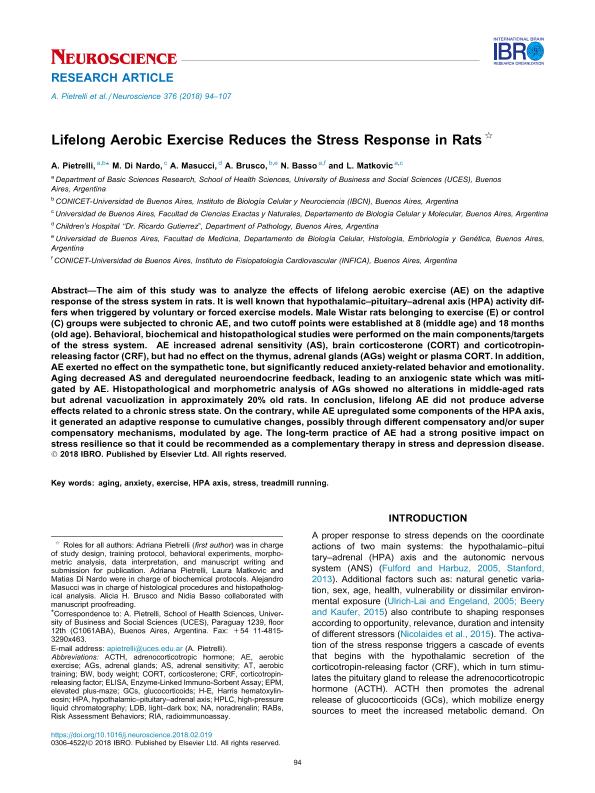Mostrar el registro sencillo del ítem
dc.contributor.author
Pietrelli, A.
dc.contributor.author
Di Nardo, M.
dc.contributor.author
Masucci, A.
dc.contributor.author
Brusco, Herminia Alicia

dc.contributor.author
Basso, N.
dc.contributor.author
Matkovic, Laura Beatriz

dc.date.available
2019-11-08T18:48:23Z
dc.date.issued
2018-04
dc.identifier.citation
Pietrelli, A.; Di Nardo, M.; Masucci, A.; Brusco, Herminia Alicia; Basso, N.; et al.; Lifelong Aerobic Exercise Reduces the Stress Response in Rats; Pergamon-Elsevier Science Ltd; Neuroscience; 376; 4-2018; 94-107
dc.identifier.issn
0306-4522
dc.identifier.uri
http://hdl.handle.net/11336/88377
dc.description.abstract
The aim of this study was to analyze the effects of lifelong aerobic exercise (AE) on the adaptive response of the stress system in rats. It is well known that hypothalamic–pituitary–adrenal axis (HPA) activity differs when triggered by voluntary or forced exercise models. Male Wistar rats belonging to exercise (E) or control (C) groups were subjected to chronic AE, and two cutoff points were established at 8 (middle age) and 18 months (old age). Behavioral, biochemical and histopathological studies were performed on the main components/targets of the stress system. AE increased adrenal sensitivity (AS), brain corticosterone (CORT) and corticotropin-releasing factor (CRF), but had no effect on the thymus, adrenal glands (AGs) weight or plasma CORT. In addition, AE exerted no effect on the sympathetic tone, but significantly reduced anxiety-related behavior and emotionality. Aging decreased AS and deregulated neuroendocrine feedback, leading to an anxiogenic state which was mitigated by AE. Histopathological and morphometric analysis of AGs showed no alterations in middle-aged rats but adrenal vacuolization in approximately 20% old rats. In conclusion, lifelong AE did not produce adverse effects related to a chronic stress state. On the contrary, while AE upregulated some components of the HPA axis, it generated an adaptive response to cumulative changes, possibly through different compensatory and/or super compensatory mechanisms, modulated by age. The long-term practice of AE had a strong positive impact on stress resilience so that it could be recommended as a complementary therapy in stress and depression disease.
dc.format
application/pdf
dc.language.iso
eng
dc.publisher
Pergamon-Elsevier Science Ltd

dc.rights
info:eu-repo/semantics/openAccess
dc.rights.uri
https://creativecommons.org/licenses/by-nc-sa/2.5/ar/
dc.subject
AGING
dc.subject
ANXIETY
dc.subject
EXERCISE
dc.subject
HPA AXIS
dc.subject
STRESS
dc.subject
TREADMILL RUNNING
dc.subject.classification
Neurociencias

dc.subject.classification
Medicina Básica

dc.subject.classification
CIENCIAS MÉDICAS Y DE LA SALUD

dc.title
Lifelong Aerobic Exercise Reduces the Stress Response in Rats
dc.type
info:eu-repo/semantics/article
dc.type
info:ar-repo/semantics/artículo
dc.type
info:eu-repo/semantics/publishedVersion
dc.date.updated
2019-10-23T14:42:02Z
dc.journal.volume
376
dc.journal.pagination
94-107
dc.journal.pais
Países Bajos

dc.journal.ciudad
Amsterdam
dc.description.fil
Fil: Pietrelli, A.. Universidad de Ciencias Empresariales y Sociales; Argentina. Consejo Nacional de Investigaciones Científicas y Técnicas. Oficina de Coordinación Administrativa Houssay. Instituto de Biología Celular y Neurociencia "Prof. Eduardo de Robertis". Universidad de Buenos Aires. Facultad de Medicina. Instituto de Biología Celular y Neurociencia; Argentina
dc.description.fil
Fil: Di Nardo, M.. Universidad de Buenos Aires. Facultad de Ciencias Exactas y Naturales. Departamento de Química Biológica. Laboratorio de Biología Celular y Molecular; Argentina
dc.description.fil
Fil: Masucci, A.. Gobierno de la Ciudad de Buenos Aires. Hospital General de Niños "Ricardo Gutiérrez"; Argentina
dc.description.fil
Fil: Brusco, Herminia Alicia. Consejo Nacional de Investigaciones Científicas y Técnicas. Oficina de Coordinación Administrativa Houssay. Instituto de Biología Celular y Neurociencia "Prof. Eduardo de Robertis". Universidad de Buenos Aires. Facultad de Medicina. Instituto de Biología Celular y Neurociencia; Argentina
dc.description.fil
Fil: Basso, N.. Universidad de Ciencias Empresariales y Sociales. Rectorado. Departamento de Investigaciones; Argentina. Universidad de Buenos Aires. Facultad de Medicina. Instituto de Fisiopatología Cardiovascular; Argentina
dc.description.fil
Fil: Matkovic, Laura Beatriz. Universidad de Buenos Aires; Argentina. Universidad de Ciencias Empresariales y Sociales; Argentina
dc.journal.title
Neuroscience

dc.relation.alternativeid
info:eu-repo/semantics/altIdentifier/url/https://www.sciencedirect.com/science/article/pii/S0306452218301362
dc.relation.alternativeid
info:eu-repo/semantics/altIdentifier/doi/http://dx.doi.org/10.1016/j.neuroscience.2018.02.019
Archivos asociados
